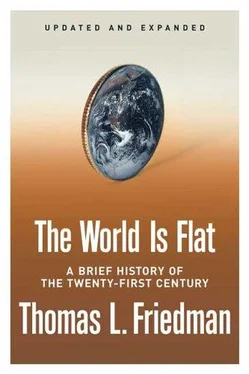In other words, imagination is also a product of necessity-when the context you are living in simply does not allow you to indulge in certain escapist or radical fantasies, you don't. Look where the most creative innovation is happening in the Arab-Muslim world today. It is in the places with little or no oil. As I noted earlier, Bahrain was one of the first Arab Gulf states to discover oil and was the first Arab Gulf state to run out of oil. And today it is the first Arab Gulf state to develop comprehensive labor reform for developing the skills of its own workers, the first to sign a free-trade agreement with the United States, and the first to hold a free and fair election, in which women could both run and vote. And which countries in that same region are paralyzed or actually rolling back reforms? Saudi Arabia and Iran, which are awash in oil money. On December 9, 2004, at a time when crude oil prices had soared to near $50 a barrel, The Economist did a special report from Iran, in which it noted, “Without oil at its present sky-high price, Iran's economy would be in wretched straits. Oil provides about half the government's revenue and at least 80% of export earnings. But, once again under the influence of zealots in parliament, the oil cash is being spent on boosting wasteful subsidies rather than on much-needed development and new technology.”
It is worthy of note that Jordan began upgrading its education system and privatizing, modernizing, and deregulating its economy starting in 1989-precisely when oil prices were way down and it could no longer rely on handouts from the Gulf oil states. In 1999, when Jordan signed its free-trade agreement with the United States, its exports to America totaled $13 million. In 2004, Jordan exported over $1 billion of goods to America-things Jordanians made with their hands. The Jordanian government has also installed computers and broadband Internet in every school. Most important, in 2004, Jordan announced a reform of its education requirements for mosque prayer leaders. Traditionally, high school students in Jordan took an exam for college entrance, and those who did the best became doctors and engineers. Those who did the worst became mosque preachers. In 2004, Jordan decided to gradually phase in a new system. Henceforth, to become a mosque prayer leader, a young man will first have to get a B.A. in some other subject, and can study Islamic law only as a graduate degree-in order to encourage more young men of talent to go into the clergy and weed out those who were just “failing” into it. That is an important change in context that should pay dividends over time in the narratives that young Jordanians are nurtured upon in their mosques. “We had to go through a crisis to accept the need for reform,” said Jordan's minister of planning, Bassem Awadallah.
There is no mother of invention like necessity, and only when falling oil prices force the leaders in the Middle East to change their contexts will they reform. People don't change when you tell them they should. They change when they tell themselves they must. Or as Johns Hopkins foreign affairs professor Michael Mandelbaum puts it, “People don't change when you tell them there is a better option. They change when they conclude that they have no other option.” Give me $10-a-barrel oil, and I will give you political and economic reform from Moscow to Riyadh to Iran. If America and its allies will not collaborate in bringing down the price of crude oil, their aspirations for reform in all these areas will be stillborn.
There is another factor to consider here. When you have to make things with your hands and then trade with others in order to flourish, not just dig an oil well in your own backyard, it inevitably broadens imagination and increases tolerance and trust. It is no accident that Muslim countries make up 20 percent of the world's population but account for only 4 percent of world trade. When countries don't make things anyone else wants, they trade less, and less trade means less exchange of ideas and openness to the world. The most open, tolerant cities in the Muslim world today are its trading centers-Beirut, Istanbul, Jakarta, Dubai, Bahrain. The most open, tolerant cities in China are Hong Kong and Shanghai. The most closed cities in the world are in central Saudi Arabia, where no Christians, Hindus, Jews, or other non-Muslims are allowed to express their religions in public or build a house of worship, and, in the case of Mecca, even enter. Religions are the smelters and founders of imagination. The more any religion's imagination—Hindu, Christian, Jewish, Muslim, Buddhist-is shaped in an isolated bubble, or in a dark cave, the more its imagination is likely to sail off in dangerous directions. People who are connected to the world and exposed to different cultures and perspectives are far more likely to develop the imagination of 11/9. People who are feeling disconnected, for whom personal freedom and fulfillment are a Utopian fantasy, are more likely to develop the imagination of 9/11.
Just One Good Example
Stanley Fischer, the former deputy managing director of the IMF, once remarked to me, “One good example is worth a thousand theories.” I believe that is true. Indeed, people do not change only when they must: They also change when they see that others-like themselves-have changed and flourished. Or as Michael Mandelbaum also points out, “People change as a result of what they notice, not just what they are told”-especially when what they notice is someone just like them doing well. As I pointed out in Chapter 10, there is only one Arab company that developed a world-class business strong enough to get itself listed on the Nasdaq, and that was Aramex. Every Jordanian, every Arab, should know and take pride in the Aramex story, the way every American knows the Apple and Microsoft and Dell stories. It is the example that is worth a thousand theories. It should be the role model of a self-empowered Arab company, run by Arab brainpower and entrepre-neurship, succeeding on the world stage and enriching its own workers at the same time.
When Fadi Ghandour took Aramex public again in 200 5, this time in Dubai, some four hundred Aramex employees from all over the Arab world who had stock options divided $14 million. I will never forget Fadi telling me how proud these employees were-some of them managers, some of them just delivery drivers. This windfall was going to enable them to buy homes or send their kids to better schools. Imagine the dignity that these people feel when they come back to their families and neighborhoods and tell everyone that they are going to build a new house because the world-class Arab company they work for has gone public. Imagine how much dignity they feel when they see themselves getting ahead by succeeding in the flat world-not in the traditional Middle Eastern way by inheritance, by selling land, or by getting a government contract-but by working for a real company, an Arab company. Just as it is no accident that there are no Indian Muslims in al-Qaeda, it is no accident that the three thousand Arab employees of Aramex want to deliver only packages that help economies grow and Arab people flourish-not suicide bombs.
Speaking of the Aramex employees with stock options, Ghandour said, “They all feel like owners. A lot of them came up to me and said, 'Thank you, but I want to invest my options back in the company and be an investor in the new IPO.'”
Give me just one hundred more examples like Aramex, and I will start to give you a different context-and narrative.
From Untouchables to Untouchables
And while you are at it, give me one hundred Abraham Georges as well-individuals who step out of their context and set a different example can have such a huge impact on the imagination of so many others. One day in February 2004, I was resting in my hotel room in Bangalore, when the phone rang. It was a young Indian woman who said she was attending a private journalism school on the outskirts of the city and wanted to know if I would come by and meet with her class. I've learned over the years that these sorts of accidental invitations often lead to interesting encounters, so I said, “What the heck, sure. I'll come.” Two days later I drove ninety minutes from downtown Bangalore to an open field in which stood a lonely journalism school and dormitory. I was met at the door by a handsome, middle-aged Indian man named Abraham George. Born in Kerala, George served in the Indian Army, while his mother immigrated to the United States and went to work for NASA. George followed her, went on to study at NYU, started a software firm that specialized in international finance, sold it in 1998, and decided to come back to India and use his American-made fortune to try to change India from the bottom-the absolute bottom-up.
Читать дальше












